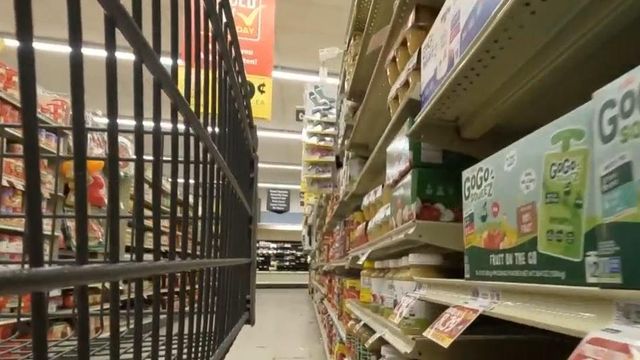WRAL Investigates: 'Greedflation' and other drivers behind inflation at the grocery store
Inflation jumped to 3.5% last month. That's bad news for people trying to put food on the table.
"I eat a lot. It’s rough," Cooper Blanton told WRAL Investigates about his grocery bill.
"A bag of potato chips used to be two or three bucks, now it’s like four or five dollars" said Haley Mize.
Simple staples of the past are now a drain on the bank account.
Compared to pre-pandemic prices, ground beef is up 35%, chips are up 45%, bread is up 57% and a 12-ounce can of soda is up 66%, according to the Bureau of Labor Statistics, which tracks trends on common grocery store items. All of those increases are well above the inflation rate over that same period of time.
Consumers have been given many reasons over the past couple of years, from the coronavirus to the Russian war with Ukraine to worker shortages.
As prices continue to rise, a rising number of Americans think corporate greed is the real driver. One recent poll showed 59% of people believe in so-called "greedflation." Corporate greed is now tied with government spending in the public's perception of what's behind inflation.
"They're in the business to make money," says Gerald Cohen, the chief economist at UNC's Kenan Flagler business school. For years, WRAL Investigates has tracked corporate quarterly and annual earnings reports.
Cohen says that and other data do prove companies are making more.
"That kind of share that we’ve seen, around 17.5% of output goes to corporate profits, is higher than the average of the last 50-plus years," Cohen said.
Cohen won't call it greed, saying there are recent outside forces that impact prices like the bird flu and supply chain disruptions caused by things like the Baltimore bridge collapse. The issue is whether the size of recent price hikes is necessary.
"Now there’s this question of whether they’re overdoing it," Cohen said.
Many consumers call it "greedflation" and they point to gold lined pockets of company Chief Executive Officers. Food supplier Conagra's boss made $18.7 million last year, a 58% raise from the year before. Kraft Heinz's CEO made more than $11 million - a 61% raise.
And the head of General Mills got a 19% percent raise last year, making almost $14 million. Data shows the percentage of those pay raises are much, much higher than the average worker at those companies.
Cohen understands the perception of families who are paying more at the checkout. "It's not surprising people are linking those things," he said.
But instead of only pointing fingers, he said you can me a difference.
"Households can have a huge impact on the prices of goods and services," Cohen explained about the buying power of the public.
If that brand name product is getting too pricey, go generic.
"If the prices of something goes up too much and people stop buying it, the price has to come down," he said. Cohen added if people are still willing to pay higher prices for those eggs or meat or snacks, companies have no incentive to lower prices.
And with many Americans getting raises that are finally catching up to recent inflation, Cohen says changing your buying habits is likely the only chance to lower food prices.
"The chances of food prices getting back to pre-pandemic level is very low," he said. After looking at some recent trends, Cohen changes his answer, "And I might even strengthen it and say near zero."
And with the recent news of an unexpected jump in inflation, many shoppers will have to continue to adjust their diets.
"Steak. I don’t ever eat steak anymore," Blanton told us about changes he already made.
Mize has also changed what she takes to the checkout, "Sometimes I have to cut back on certain proteins and just get some things on the cheaper side."












